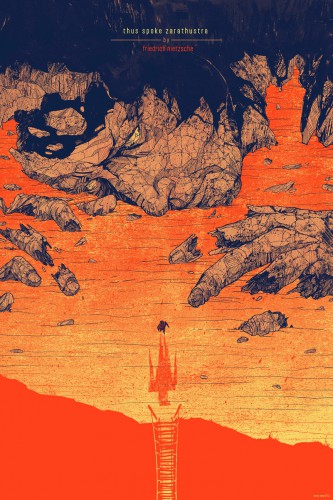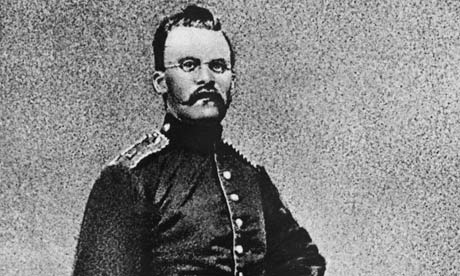
Rounding out Michael Nicholson’s favorite atheists series (read Thomas Nagel here and Camus/series intro here), we have a reflection on the notorious Prussian artilleryman:
Friedrich Nietzsche (1844 – 1900)
 Eastern Orthodox theologian David Bentley Hart, in The Beauty of the Infinite: The Aesthetics of Christian Truth, has called Nietzsche’s scathing and relentless critique of Christianity a “great camera obscura” which drew into sharp focus the scandal of Christianity’s origins and especially Christianity’s God: a God “who apparels himself in common human nature, in the form of a servant… who dies like a slave and outcast.” Hart considers Nietzsche’s critique “a most beautiful gift”, bequeathed to Christianity; a gift which “retrieved the gospel from the soporific complacency of modernity.”
Eastern Orthodox theologian David Bentley Hart, in The Beauty of the Infinite: The Aesthetics of Christian Truth, has called Nietzsche’s scathing and relentless critique of Christianity a “great camera obscura” which drew into sharp focus the scandal of Christianity’s origins and especially Christianity’s God: a God “who apparels himself in common human nature, in the form of a servant… who dies like a slave and outcast.” Hart considers Nietzsche’s critique “a most beautiful gift”, bequeathed to Christianity; a gift which “retrieved the gospel from the soporific complacency of modernity.”
I first encountered Nietzsche (his writing, anyway) hitchhiking through the desert Southwest with a friend many years ago. We were camping beside the Rio Grande, near Taos, Mexico for about a week. On a visit to the town library—I remember an adobe building with a cool, deep interior with dark wood trim and mission-style furniture—I bought two used books at a sale, a minor science fiction classic called A Voyage to Arcturus, and Friedrich Nietzsche’s Thus Spake Zarathustra. David Lindsay wrote A Voyage to Arcturus in 1920 after serving in the British army during World War I. That trauma, and his philosophical frame of mind, turned his book into a desperate meandering search on an imaginary planet, looking for the metaphysical foundations of reality—the really real. The story he writes ends as it travels, in uncertainty bordering on despair.
I muse now that it was an odd coincidence that both Lindsay and Nietzsche were dealing with the question of overcoming nihilism in what they believed was a reality in which God is absent and “Truth” is a forever receding horizon. At the time we were in Taos, I was wandering the landscape, literally and spiritually, looking for meaning. Years later, I decided that the best label for my sensibility during that period and my subsequent Christian conversion was ‘existential’.
I thus began reading Thus Spake Zarathustra as a truth-seeker, not a Nietzsche scholar or aficionado. I finished Nietzsche’s book back home in August that summer. While I didn’t buy into his whole death of God idiom, I did for a time grasp onto his idea that our ordinary humanness is something to be overcome and the key to doing that was through the heroic individual assertion of the will to power—an aesthetic re-molding of ourselves in whatever way we desire.
“Will to power” is one of those Nietzschean ideas which lends itself to misunderstanding. Nietzsche wasn’t interested in, or focused on, political power, brute force, or violence; though he did regard all life as struggle and chaos. Will to power is life—Nietzsche is nearly vitalistic in his celebration of a self-subsisting life-force—expressing itself. Self-preservation is an aspect of this will to power, but so is self-creation, particularly for human beings. Out of the raw chaos and flux which is the never-still, eternally becoming, nature of life, we humans must make who we are as selves, without reference to essential templates or divine images. For Nietzsche, the artist, more so than the conqueror, was a paradigm of will to power. The ubermensch—the “overman” (badly translated “superman”)—was not the one who could assert his will over others, but the one who could will to be himself. Yet, misunderstood as he was and is, Nietzsche was still blazingly wrong. We really can’t create our selves from the flux of the natural world or the detritus of our own human culture. Attempts to do so always end in sadness or tragedy. I can only receive my self as a gift from God.
To make a very long story (a personal as well as a historical one) abruptly short, I believe Nietzsche was a necessary dead-end. For myself, I needed to try on the “will to power” before I was ready to admit the bankruptcy of my soul. Historically, Nietzsche tore the mask of civility off the genteel godlessness of European Christendom. What lay behind it was revealed 14 years after his death, when WWI ushered in the bloodiest century in human history. Nietzsche’s critique of Christendom’s seduction by modernity was prescient if not prophetic. And his sharp, clear dichotomy between embracing the life of the Crucified one, and Nietzsche’s own “Dionysian” affirmation of a living “will to power” is, as Hart put it, a gift to Christian theology.
Nietzsche is misunderstood but still wrong in his “affirmative philosophy” (a term I am borrowing from R. Solomon’s and K. Higgins’, What Nietzsche Really Said). You can’t really affirm your way out of nihilism. While Nietzsche recognized Enlightenment modernity as exhausted and empty, his own attempt to leverage some sense of transcendence out of amor fati (love of fate), a somewhat elitist this-worldly joie de vivre, and a heroic making of oneself into the Übermensch, was as doomed as the Romanticist rebellion which was one of the roots of Nietzsche’s thought. Indeed, Nietzsche’s work and life turned out to be the gravestone of Romanticism. This would make Nietzschean disciples Derrida, Foucault, and others who look to Nietzsche for inspiration the walking dead of the postmodernity that he presaged.
As I grew out of my childhood, I remember my then-fading religious feelings were finally wrung out of me by the demands and regimentation of a denominational boarding school. When I was about fourteen my father tried to answer my growing skepticism by gesturing toward the stars one night and prodding me, “Who do you think created these?” I said I did not know, and didn’t really care. But I did. My adolescent atheism was short-lived, and I soon discarded it like the affectation it was. To imagine God is, can be difficult, even painful. To imagine God is not, is a self-inflicted wound, even if often an understandable one. And so I read and marvel at the insight and erudition of my favorite atheists; I think I share some of the weltschmerz they experience, the painful difference between the what is and what ought—and ought not—to be; I sometimes feel that if my only choice were between, say, the anguished depth of Camus’s existentialism and the shallow emotivism of some strands of Pop Christianity it would be a tough decision. Paradoxically, probing the questions and ideas of atheist philosophers and scientists has enlarged and deepened my faith, but I also feel anguish, and obligation, over those who have wandered off into a far country and have not yet returned.

COMMENTS
3 responses to “These Are a Few of My Favorite Atheists: Friedrich Nietzsche”
Leave a Reply














I think I need a The Beauty of the Infinite reading group. Having made a couple of short stabs at it by myself, I’m impressed with anyone who’s gotten further. Hart’s latest, The Experience of God, is going much better.
Thank you for this series.
You’re welcome! Yes, Hart’s “Beauty of the Infinite” is a tough plow, but worth the effort. I very specifically sought out his comment/critique on Nietzsche, then re-read the introduction, and then skipped over most of the next section (I’ll get back to it) to start reading his exposition of the Trinity. It’s serious theology, but without a doubt it’s the best systematic discourse on the nature and relations of the Trinity I have read in thirty years of reading systematic theology.
Modern history of ideas is a battleground between Apollo and Dionysus, the shallow war of transcendent reason and imminent emotional existentialism. This was Nietzsche’s idea, and sadly bourgeoisie European christendom was the lens he saw Christ through.
I’ve appreciate Nietzsche’s criticisms as a strange kind of scourge upon the idols. Like you, I found his ‘will-to-power’ as flooring, but ultimately bankrupt. In a sense, he is the Twilight of one set of idols, and tried to open the horizon to a new and more interested set. But dumb-and-deaf gods will always be boring, and Fate will always be blind.
As a song lyric goes:
Sing to me of a pale Gallilean,
Graying the world with his breath,
That wraith is not my master,
In fact we’ve never met